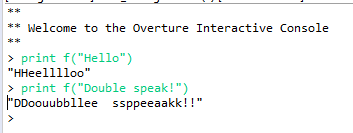Malbolge, 20775 and 2334 bytes
Probably I didn't beat anyone with it, but it was incredibly fun to make.
bP&A@?>=<;:9876543210/.-,+*)('&%$T"!~}|;]yxwvutslUSRQ.yx+i)J9edFb4`_^]\yxwRQ)(TSRQ]m!G0KJIyxFvDa%_@?"=<5:98765.-2+*/.-,+*)('&%$#"!~}|utyrqvutsrqjonmPkjihgfedc\DDYAA\>>Y;;V886L5322G//D,,G))>&&A##!7~5:{y7xvuu,10/.-,+*)('&%$#"yb}|{zyxwvutmVqSohmOOjihafeHcEa`YAA\[ZYRW:U7SLKP3NMLK-I,GFED&%%@?>=6;|9y70/4u210/o-n+k)"!gg$#"!x}`{zyxZvYtsrqSoRmlkjLhKfedcEaD_^]\>Z=XWVU7S6QPON0LKDI,GFEDCBA#?"=};438y6543s1r/o-&%*k('&%e#d!~}|^z]xwvuWsVqponPlOjihgIeHcba`B^A\[ZY;W:UTSR4PI2MLKJ,,AFE(&B;:?"~<}{zz165v3s+*/pn,mk)jh&ge#db~a_{^\xwvoXsrqpRnmfkjMKg`_GG\aDB^A?[><X;9U86R53ONM0KJC,+FEDC&A@?!!6||3876w4-tr*/.-&+*)('&%$e"!~}|utyxwvutWlkponmlOjchg`edGba`_XW\?ZYRQVOT7RQPINML/JIHAFEDC&A@?>!<;{98yw5.-ss*/pn,+lj(!~ff{"ca}`^z][wZXtWUqTRnQOkNLhgfIdcFaZ_^A\[Z<XW:U8SRQPOHML/JIHG*ED=%%:?>=~;:{876w43210/(-,+*)('h%$d"ca}|_z\rqYYnsVTpoRPledLLafIGcbE`BXW??TY<:V97S64P31M0.J-+G*(DCB%@?"=<;|98765.3210p.-n+$)i'h%${"!~}|{zyxwvuXVlkpSQmlOjLbafIGcbE`BXW??TY<:V97S64P31M0.J-+G*(D'%A@?"=<}:98y6543,1r/.o,+*)j'&%eez!~a|^tsx[YutWUqjinQOkjMhJ`_dGEaDB^A?[><X;9U86R53O20LKJ-HG*ED'BA@?>7~;:{y7x5.3210q.-n+*)jh&%$#"c~}`{z]rwvutWrkpohmPkjihafI^cba`_^A\[>YXW:UTS5QP3NM0KJ-HGF?D'BA:?>=~;:z8765v32s0/.-nl$#(ig%fd"ca}|_]yrqvYWsVTpSQmPNjMKgJHdGEa`_B]\?ZY<WVUTMR5PO20LK.IHA))>CB%#?87}}49zx6wu3tr0qo-nl*ki'hf$ec!~}`{^yxwvotsrUponQlkMihKIe^]EEZ_B@\?=Y<:V97S64P31M0.J-+GFE(C&A@?8=<;:{876w43s10qo-&%kk"'hf$ec!b`|_]y\ZvYWsVTpSQmlkNiLgf_dcba`C^]\?ZY;WV97SLK33HM0.J-+G*(D'%A$">!};|z8yw543t1r/(-,+*)(i&%fd"!~}|_t]xwvutslqTonmPNdchKIeHFbaD_AWV[><X;9U86R53ON1L.DCH+)EDC&;@#>=<;|98x6wu32s0p(',mk)(i&f|{"ca}`^z][wZXtWUqTRnmPNjcbJJ_dcbEDYB@@?ZSX;VUTS6QPO11F..CHGF)(C<A$?>=<}:98xx/uu,10/po,+$kiih%$#z!b}|{z]xwvXXmUUjonmPOjihafIdcbaD_^]??T<<QVUT76QPONG0..-HGFED=B%@?>=~|438yw5vt21r/o'&+lj(ig%fd"ca}`^z][wZXtWUqpoRQlkjihafIdcbaDBXW\?=YX;9UNMR53O20//DIH+)E>=B%#?"~<}{9zx6wu3tr0/pn,%$jj!&%$ed!~}|{zs\ZZYtsrqponglOjiLgfHdGEaDB^]@[=SRW:8T75Q42N1/K.,HG*E'=<A$"!!6;:{8x0/4us1rp.-,ml)('&%$#z!b}|{zy[qvutsUkTinmlejchKIIH]bE`_^A\[=Y<:VU86RKJO20LK.,HA@E(&BA$">76;|z8yw5vt2sq/pn,mkjj!&%$edy~a|{z][qpuXVUUjonQOkdchKIHH]baD_AWV[><;;PUT7R4JIN1/K.,H+)E(&B%#?"~<}{zz1654ut1*qoon+*#(i&%$e"!~``uzy\ZvonsVTSShmlOjLbafIGFF[`_B@\UTY<:99NSR53OHGL/-I,*F)'C&$@#!=~|:{y765vu21*/pnnm*)(!h%$#d!~}__tyx[vXnmrUSoRPlkNiKa`eHFbECBBW\[>Y;QPU86R53O20L/-I,*F)'&&;@?>!~;:92ywwv3210).o,+*k('g%fd"ca}`^z][wZXtsVqSihmPNjiLgI_^cFD`_B]?UTY<:VUT76QPONGL/--,GFEDC<%@?>!<;:98yw5.-2sq/.o,l$#(ig%fd"!b`|uty\ZYYnsrUpRhglOMiLJfIGcFD`CA]@>==RWVU87RQPONG0..-HGFEDC<A$?>!<;:zz1ww.321rq.-,+*)"'hffe"!~}|{zyrwZutsVqpoQQfkjMhJ`_dGEaDBAAV[Z=;WPOT75Q4211FKJ-+G@?D'%A$">!};|z8yw5vt210qp-,+*)('&}$e"!~}|^tyxwvXnWlqpohmfkNLLK`IdcbE`_^]\?=YRQV97S64P31ML/J,BAF)'CB%@"87<}{9zx6wu3tr0qo-nlkk"'&%fezcaa`{ty\wvuXsrTpSQmPNjiLJf_^cFD`_B@\UTY<:V97S64P31M0.J-+GFE('B;@#!!~;:3z765v321qq(-,m*j"!&ge#db~}`{]srwZXtWUTTinmPkMcbgJHdGEaDB^A?[><X;988MRQP32MLE.,,+FED=B%@?>!}549zxww.32sq/(',mk)(i&f|{"ca}`^z][wZXtWUqTRnQOkNLhgfIHcbaZ_B@@?ZYXWP9TSR5PON00EJI,*F?>C&$##8=<}:z216wu32s0p(',mk)jh&ge#db~a_{^\x[YuXVUUjonmPOjihg`IdcFa`BAAV[Z=;WPOT75Q42N1/K.,HGF)(CBA@?8=~;:9z76v43tr0)(-nl*)j'g}|#db~a_^^sxwZXtmlqTRnQOkNLhKIeHFbEC_^]@?ZYXWVUN7554ONMLKJIBG*EDC&$:9!!6;:9zy6543210/(o,+*)(h~%$#"bxav{tyxwpuXVVUjoRmlkNihJfIGcFD`CA]@>ZY<:VONS64PO2M/EDI,*F)'C&$@#!=~|:98yx/4u21r/.-mm$)(i&f|{"ca}`^z][wZXtWUqTRnQOkjMhJ`_dGEaDB^A?>>SXWV98SL5332MLEJ-HGF)DC%A@#>~65:{y76w4t,+0qo-,m*j"!&ge#"c~`vuz][wZXtWUqTRnQOkNLhgfIHcb[`C^]\[>YXW99N66KPON10KJIB+))(CBA@9>!<;:9z765uu,10q.n&%*ki'&g$dzy~a_{^\x[YuXVrUSoRPlOMiLJfIGFF[`_^A@[ZYXQV9TSRQ4ON0L/-,,AFE(C%;:?"~<;|z8105vtss*/.o,l$#(ig%fd"ca}`^z][wZXtWUTTinmlONihgfe^GEED_^]\[ZSX;VUT7RQP22GLK.I+A@E(&%%:?>!};438yw5vtss*/.om+$#(ig%$ec!xw|_]y\ZvYWsVTpSQmPNMMbgfeHGba`_^]V[>YX;VUTSR53OHGL/-,,AFE(C%;:?"~<;|9y105vt2sq/pn,mk)jh&ge#db~a_{zy\[vutsrqpiRmlkjiKafedcE[DY^]\UZSX;VUT7RQ322GLK.I+A@E(&BA$">76;|z8yw5vt2sq/pn,mk)jh&geddy~}|_^s\ZZYtmrUponQlkMihKIe^]bEC_^A\>TSX;988MRQ4O1GFK.,HG*E'=<A$">!};|z8yw5vt2sqpp',+*kj'~%f#"!b}|^z][wvYWslkpSQPPejiLJf_^cFD`_B]?UTY<:VU8S5KJO20L/-I,*F)'CB%#?87<;:{z76/vtts0/.',m*)(i&%$ddy~}`{]srwZXtWUqpSnPfejMKgJHGG\a`C^@VUZ=;W:8T75Q42N1/K.,++@EDC&%@?>7<}{{z7654-t10/p-,l*ki'&g$dzy~a_{^\x[YuXVrUSoRPlOMiLJII^cbaDC^]\[T=;;:UTSRQJO2MLK.IHGFE(&B;:?"~<}{98y6v.-2sq/pn,mk)jh&ge#db~a_{^\xwvYXsrqpohmPNNMhgfedc\E`_^A\[=YX;9UNMR53O20L/-I,*F)'C&$@#!=~|:{yxx/432sr/.-,+*#jhhg$#"!~}|uz]xwvYtsUqpSnPfejMKgJHdcFaCYX]@>Z=;WV9T6LKP31M0.J-+GF)D&<;@?>!~;:98765.3trrq.-,+*)('~g$#"c~}|{z][wpotWUqTRnQOkNLhgJeG]\aDB^]@[=SRW:8T75Q42N1/..CHGF)(CBA@?>=<5|98765u-210/o'n%*)(!&}$eccbw|_zyx[vuWsVTSShmlOMibafIGFF[`_B]?UTY<:V97S6433HML/-IBAF)'C&$@#!=~|:{y765vu,1r/.-nl$#(igff{"!b}_uty\ZYYnsrUSohglOMiLJfIGcFD`CA]@>Z=;W:877LQPO21LE.,,+FE>C&A@?"=<|{{276wu3,+0qonn%*)j'g}|#db~a_{^\x[YuXVrUSoRPlOMihgJIdc\aD_^]@[Z<XW:U7MLQ42N1/K.,H+)E(&B%#?"~<}{9zxww.321rq.-,%ljji&%$#z!b}|{^yxwYYnsrUSohglOMiLJfeHcE[Z_B@\?=Y<:V97S64P31M0.J-+**?DCB%$?>=<5:{876w432rr).-n+k#"'hf$#d!awv{^\xwZXtmlqTRnQOkNLhKIeHFbEC_B@\?=YXW:9TSRQPI200/JIHGFE>C&A@#!76||3876wv3210/.',m*)j'&%eez!~a_{tsx[YXXmrqTRngfkNLhgJeG]\aDB^A?[><;;PUTS65PONMLKJC,**)DCBA@?>=6;|987x54t21r/o'&+lj(ig%fd"ca``uzy\wYonsVTpSQmPNjMKgfIGc\[`_^A@[ZYXWVUTMR5PONML.DIHGF(>'<A@9>=6;|98y654tt+0/p-m%$)('hg|eccb}v{^yxwZutVrqToQgfkNLhgJeG]\aDBAAV[Z=X:POT7544INM0.JCBG*(D'%A$">!};|z8yw543ts0).o,+*)j'&%eezbbw|{z]\wvoXVVUponglOjihgJedcEEZ_^A?[TSX;9UT7R4JIN1/K.,H+)E(&B%#?"~<}{9zx6wutt+0/.on+*)"'h%$#"c~}|^^sxwZuWmlqTRnQOkjMhJ`_dGEaDB^A?[><X;9U86R53ON1L.DCHGF)(CBA@9"~~}:9876/4u210/p-,l*kihh}$#db~wv{^\[[putWUqjinQOkjMhJ`_dGEaDB^A?[><X;9U8655JONM0/JIHGF?D'BA@?"=<;{{2xx/432sr/.-,+*)(!h%$#"!aw|{zy[qZotsrkpinQOONchKfedcFa`B^A?[Z=X:POT7544INM0K-CBG*(D'%A$">!};|z8yw5vtss*/.-nm$)j'&%$e"!a}`^]]rwvYWslkpSQmPNjMKgJHdGEaDB^A?[ZY<;VO8665POHM0KJ-HGFED'%A:9>!}||387x5u-,1rp.-n+k#"'hf$ec!b`|_]y\ZvYWsVTpSQmlkNMhg`eHFFE`_^]V[>YXW:UTS55JON1L.DCH+)E(&BA$?!76;|z8yw54u2r*).om+lj('h%e{z!b`|{z]\wvutmrUponQOediLJII^cbEC_XW\?=Y<:V97S64P31M0.J-+G*(D'%$$9>=<}|98765.ussr/.-,+*#(i&%$e"!~``u]]rwvuXWrqponmfkNihKfeGcFD`CA]@>==RWV9T6LKP31M0.J-+G*(D'%A$">=<}|9876543,s0/p-,lkk"'&ge#zy~a_{^\x[YutWUqjinQONNchgfIHcba`_^]\UZ=XWVUT6LQPON0F/DIHG@E>C&A@#>=<||387x5u-,1rp.om+lj(ig%fd"ca}`^zy\wYonsVTpSQmPNMMbgfeHG\ECCB]V[>YXW:UT6R53O20//DIH+)E>=B%#?>!<|438yw5vt21rp.'&+lj(ig%fd"ca}`^zyx[ZunsVqpoRmlNjiLJf_^cFD`CA]@>Z=;WV9T6LKP31ML/J,BAF)'CB%@"87<}{zz1654ut10)pnnm*)(!&g$#"cawv{^\xwZuWmlqTRnQONNchgJeG]\aDB^]@[=SRW:8T75Q42N1/K.,H+)((=BA@#"=<;49z765v321qq(-,mk)"!&ge#"c~`vuz][wZXWWlqpSQmfejMKgfIGc\[`CA]@>Z=;W:8T75Q42NML/.IHGF?(&&%@?>=<5:{876w432rr).-n+k#"'hf$ec!~a|^tsx[YuXVUUjonQlNdchKIeHFbEC_B@\?=Y<:99NSRQ43NMLKJCH+))(CBA@?>7~;:9z76v43t1q)(-nl*ki'hf$ec!b`|_]y\ZvYWsVTSShmlkNMhgfedc\ECCB]\[ZYXWPU8SRQ4ONMLK.,HA@E(&BA$?!76;|z8yw5vt2sq/pn,mk)jh&ge#db~}|_^yxwvutslqTRRQlkjihgfe^Gba`C^]?[Z=;WPOT75Q42N1/K.,H+)E(&B%#?"~<}{zz1654ut10/.-,+*#j'&%$#cy~}|{]s\qvunsrkpSQQPejMhgfIdcEa`C^@VUZ=;WV9T6LKP31ML/J,BAF)'C&$@#!=~|:{y7xv4usrr).-,ml#(iggf#zc~}|_zy[wZXtsVTpihmPNjMKgfIdF\[`CA]\?Z<RQV97S64P31M0.--BGFE('B;$""!<;49z765v32r0qonn%*)jh&}|#dbaav{z]xZpotWUqTRnQONNchgJHd]\aDB^A?[><X;9U86RQP32MLEJ-++*EDC<%@?>!<;{9zx6wu3tr0qonn%*)j'g}|#db~}`{]srwZXtsVqSihmPNMMbgfIGc\[CCX]\[>=XWVO8665PONMFK.IHG*ED&B%#?>!<|438yw54u2r*).omll#('hf${z!b`|{^y[qpuXVrUSoRPlOMLLafedGFa`_^W\?ZYX;VU7SR5P2HGL/-I,*F)'C&$@#!=~|:{y7xv4usrr).-,ml)('&%|eccb}|{zyxqvYtsrUSihmPNjMKgfIdF\[`CA]@>Z=;WV9T6LKP31M0.J-+G*(''<A@?"!<;:98705v321rp(',mk)jh&%fd"yx}`^z][wZXtsVTpihmPNjMKgJHdGEaDBAAV[ZY<;VUTSRQPI200/JIHGFEDC<A$?>=~|438yw54u2r*).om+lj(igff{"!b`|uty\ZvYWsVTpSQmPNjMKgfeHGba`_^]\[TY<WVUTS5KPONM/E.CHGF?D=B%@?>!<;{9zx6wu32s0p(',mk)(i&f|{"ca``uzy\wYonsVTpSQPPejiLJf_^cFD`CA]@>Z=;W:8TSR54I200/JCH+FED'BA#?"~<}{98y6v.-2sq/pn,mk)(ig%|{"ca}`^z][wZXtsVqSihmPNMMbgfeHGb[`C^]\?ZY;WV97SLKP31M0.J-+G*(D'%A$">!};|z8ywvv-210qp-,%ljji&%${"c~}|_zy[wvYtVlkpSQmlOjLbafIGcbE`BXW\?=Y<:99NSR5P2HGL/-I,*F)'C&$##8=<;|{876/4u210q.-,ll#('hf${z!b`|{^\xqpuXVrUSonQlNdchKIedGEaZY^A?[><X;9U86R53O20//DIHG*)DCBA:#!!~;:98705v321r/.-mm$)(i&f|{"ca}`^zy\wYonsVTpoRmOediLJII^cbE`BXW\?=YX;V8NMR53O20L/-I,*F)'&&;@?>!~;:98705v321r/.n,mk)jh&ge#"ca}vuz][wZXtsVTpihmPNjMKgJHdGEa`C^@VUZ=;::OTSR54ONMLKJC,**)DCBA@?>7<}:98y65u3tr0qonn%*)j'g}|#db~a_{z]xZpotWUqTRnQOkNLhgJHd]\a`_BA\[ZYXWVOT7RQP3NM/KJ-H*@?D'%A$">!};|z8yw5vt2sq/pn,mkjj!&%$ed!~}|{zyxqZutsrqSinmlkMcLafed]b[`CAA@UZ=XWV9TS544INM0.JCBG*(DC&$@98=~|:{yxx/43tr0)(-nl*ki'hf$ec!b`|{^y[qputsVUjoRmlkNihJII^cbE`BXW\?=<<QVU8S5KJO20LK.I+A@E(&BA$?!76;|z87x5u-,1rp.om+ljii~%$#dc~w`^^]xwpuXsrqTonmOOdihKIe^]bEC_B@\[><XQPU86R5322GLK.,HA@E(&B%#?"~<}{9zx6wutt+0/.on+*#(i&%$e"!a}`^z][wZXtWUqTRnQOkNLhKIedcFE`_^W@>>=XWVUNS6QPO2ML.JI,G)?>&&;@?>!~;:9816w43tr*).omll#('h%e{z!b`|{^y[qpuXVrUSoRPlOMiLJfIGcFD`CA]\[>=XWVUTM6QP3NML..CHG*(D=<A$"!!6;:{y70/4us1rp.om+lj('&gf#"!~}|uz]xwZutVrqToQgfkNLhKIeHFbEC_B@\?=YX;V8NMR53O20L/-IHG*)DCBA@?>7~||{87654321*/p-,+l)('gg|#"ca}vuz][wZXWWlqpSnPfejMKgJHGG\a`C^@VUZ=;WV9T6LKP31MLK.-HGFEDCBA:?"=<;:9y16543s+r).',+*#(i&%$e"!~}|_]yrqvYWsVTSShmlOMibafIGFF[`_B@\UTY<:V97S64P31M0.J-+G*(''<A@?"!6}:9z76vuu,10qo-&%*ki'hf$ec!b`__tyx[vXnmrqpSRmfkNihgJedFbaD_AWV[><XW:U7MLQ4211FKJ-H*@?D'%A$">!};|z8yw5vt2sq/.-nm*)"iggf#"!x}`{z][qpuXVUUjonQlNdchKIedGbDZY^A?[><X;9U86R53O20L/-I,*FED'&A@?8=~;:{876vv-21rp.'&+ljii~%$ec!xw|_]yx[vXnmrUSoRPlOMLLafedGFa`_^W@>>=XWVUTMR5PO2ML.JI,G)?>C&$@#!=~|:{y7xv4us1rp.om+ljii~%$#dc~}|{zsx[YYXsrqpongPkjiLgfeGG\a`C^@VUZ=;W:8T75Q4211FKJ-H*@?D'%A$"!!6;:9zy654321*qoon+*)('&%|#d!~}`{zyxwZXtmlqTRnQONNchgJHd]\aDBAAV[Z=;WPOT75QP31MFEJ-+G*(D'%A$">!};|z876wv3210/.-&+l)(i&%eddy~}`^zsrwZXtWUqTRnQONNchgJeG]\a`_BA\[ZYXWVUN7RQPON0FKJIH*@)>CBA:?8=~||{27x543t10/oo&+*k(h~}$ec!~a|^tsx[YuXVUUjonQlNdchKIedGbDZY^A?[><X;9U86R53O20LKJ-,AF)DC&$:9>!}||387x5u-,1rp.-n+k#"'hf$ec!b`|_]y\ZvYWsVTpSQmlkNMhaJedGba`BBW\[><XQPU8655JON1/KDCH+)E(&B%#?"~<;:{z76/4u21r/.n,+l)i!~%fd"ca}`^z][wZXtWUqpSnPfejMKgJHdGEa`_BA\[ZS<::9TSRQJO2MLK.IH*F)'C&$@#!=~|:{y7xv43t1q)(-nl*ki'hf$#d!awv{^\x[YutsVUponmfkNihgJedFbaD_AWV[><;;PUT75QJIN1/..CHG*(D=<A$">=~|:327xv4us1rp.om+lj(ig%$#dc~}|{zs\wvYtsUTTinmPNjcbgJHdGEaDB^A?>>SXW:U7MLQPO21LKJIHG@E(CBA$"87}}4987xw43210/.'nllk('&%$#"!x}`{z][qpuXVUUjonQlNdchKIedGbDZY^A?[><X;9U86R53O20L/-I,*FED'&A@?>=<;:38y65432r*/.-,l$k"'&%|#z!b}|_zyxZZotsVTpihmPNMMbgfIGc\[`CA]\?Z<RQV97S64P3100EJIH+*?(&&%@9>!<;|98x65v3s+*/pn,mk)jh&ge#db~a_{^\x[YuXVUUjonmPOjchKIIHcb[D_^]@[Z<XW:8TMLQ42N1/KJ-H*@?D'%A@#>~65:{y7xv4us1rp.om+ljii~%$#dc~}v_]]\wvunsVqpSnmONNchgJHd]\aDB^]@[=SRW:8T75Q42N1/KJ-H*@?D'%A$">=~|:327xvuu,10/po,+*#(iggf#"!~}v{^yx[YonVVkponQPkjihg`eHFFE`_^]\[T=XWV9TS5Q42N1/K.,H+)ED'%A:9>!};|z87x5u-,1rp.om+lj(ig%$e"bxw|_]\\qvutWVqponmleNihKfeGcFDCCX]\?Z<RQV97S64PO20LEDI,*F)'C&$@#!=~|:{yxx/432sr/.-,+*)"'h%$#d!~`|{^y[qpuXVrqToQgfkNLhgJeG]\aDB^A?[><X;9U86R53O20//DIHG*)DCBA@?>=6}:9876v.3210p(o&+*#('~%fddcx}`{z]xwYutWrTjinQOkjMhJ`_dGEa`C^@VUZ=;W:8T75Q42N1/K.,H+)((=BA@#"7<}:9z765uu,10qo-&%*kihh}$#db~wv{^\xwZuWmlqTRnQOkNLKK`edcFE`YB@@?ZYRW:UTS6QP2NM0K-CBG*(DC&A#98=~|{{276wu3,+0qo-nl*ki'hf$ec!b`|_]yxwZYtslqTonQlkjLLafeHcE[Z_^]@?ZYXQ:887RQPOHM0KJI,GF(D'%A$">!};|z8yw54u2r*).om+lj(ig%fdccx}|_z\rqvYWVVkponQPkjihafIdcFDZY^A?>>SXW:U7MLQ42NM0K-CBG*(D'%A$">!};|z8yw5vt2sq/.-nm*)('&}f#"c~}|^^sxwZXtmlqTRQQfkjMKg`_dGEaDB^A?[><XWV98SRQPONGL/--,GFEDCBA:#>=<}:9y7xv4us1rp.om+*k(h~}$ec!b`|_]y\ZvuXVrkjonmPOjihgfed]Fa`C^]\>>SXW:U7MLQPO21LKJIHGFE>C&A@?>=}5:987w/v-210).',m*)(ig}|#db~a_{z][wpotWUqTRQQfkjMKg`_dGEaDB^A?[><X;9U86RQP32G0..-HAF)DC&A@"!!6;:{8x0/4us1rp.-n+k#"'hf$ec!b`|_]y\ZvuXsUkjoRPlOMLLafedGFaZ_B]\?ZYX::OTS64PIHM0.--BGF)'C<;@#!=<}:z216wu3tr0qonn%*)(ih%${dbba|{zsx[vutWrqSonQOkdchKIHH]baD_AWV[><X;988MRQ4O1GFK.,H+)E(&B%#?"~<}{zz1654ut10/(-n+*k('&ff{"!b}_utyxwZYtsrqjSQQPkjihg`eHcbaD_^@??TYX;V8NMR53ON1L.DCH+)E(&BA$?!76;|z87x5u-,1rp.om+lj(ig%$e"bxw|{z]\wvutslqTonmlOjihJJ_GG\a`_BA\[ZYXWVUN7RQPON0FKJIH*@)>CBA:?8=~||{27x5432s0/onn%*)jh&}|#db~}`{]srwZXtWUqTRnQOkNLhKIeHFbEC_B@??TYXW:9NS6QPON1LK-IH+F(>=B%#?"~<;|z8105vt2sq/pn,mk)jh&ge#db~}|_^yr[vutsVqpoQQfNNchgfIHcbaZCAA@[ZYXQV9TSRQ42HGL/-I,*))>CB%@"87<}{zz165v3s+*/pn,mk)jh&ge#db~a_{^\[[putsVUponmfkNihgfIdcEaDBAAV[Z=;WPOT75Q42N1/K.,H+)E(&B%#?>=~}:9876/vtts0/.-,+$)j'&ge{z!b`__tyx[vXnmrUSonQlNdchKIeHFbEC_B@\?=Y<:V97S64PON10KJIHGF?D'BA$?>=}}498yw5.-2sqpp',+lj(!~%fd"!b}_uty\ZvYWsVTSShmlkNMhgfedcb[D_^A\[Z<<Q99NSRQ43NMLKJIHG@E(CBA@?!7<;:9y1x/43,10).o,+l)('gg|ddy~}|_^s\ZZYtmrUponQlkjihKIe^]bEC_^A?[TSX;9U86RQ42NGFK.,H+)E(&B%#?"~<}{9zxww.321rq.',mkkj'&}fddc~}|uz]xwvYWmlTTinmlONihg`eHFFE`_^]V?ZYX;VU7S64PO2M/EDI,*F)'&&;@?"=}549zx6wu3tr0qo-nl*kihh}$#"cb}|{zs\wvYtsrTTinmPkMcbgfeHGba`_^W\?ZYX;VU766KPO2M/EDI,*))>CB%#?87<}{9zxww.32sq/(',mk)jh&ge#db~a_{^\xwvYXsrqpongPNNMhgfedcb[`C^]@>TSX;988MRQ4O1GFK.,HG*E'=<A$">!};|z8yw5vt2sq/pn,mk)('hg$#"!~}|uz]xwZutsUUjonQOkdchKIHH]baDB^WV[><XW:U7MLQ42N1/K.,++@EDC&%@?>=<;:92y65432r*/.-,l$k"'&%|#z!b``_ty\wvuXsrqSShmlOMibafIGcbEC_XW\?=YX;V8NMR53O20L/-I,*F)'C&$@#!=~|:98yx/4ussr/(o,+l)('g%$ed!xa__^yxqvYtsrUSihPPejihKJed]bE`_^A\[=Y<:V97SR5P2HGL/-IH+F(>=B%#?>!};438yw5vt2sq/pn,mkjj!&%$ed!~}v_zy\wvuWWlqpSnPfejihKJedcb[`C^]\?=SRW:8T7544INM0.JCBG*(DC&$@98=~|:{y76w4t,+0qo-nl*ki'hfeez!~}`_zyxwvoXVVUponmlkdiLgfeHcbD`_B@\UTY<:VU8S5KJO20L/-I,*F)'C&$@#!=~|:{y765vu210/.-&+l)(i&%$#"ca}vu]]rwvuXWrqponmleNLLKfedcba`_X]@[ZY<WV877LQP3N0FEJ-+G*(D'%A@#>~65:{y7xv43tr0)(-nl*ki'hf$ec!b`|{z]\wvutsrqpinQlkjihJ`edcbDZCX]\[TYRW:UT7RQP22GLK.I+A@EDC&%:#!!~;49z765v32r0/pn,%$)jh&ge#"ca}vuz][wZXtsVqSihmPNjMKgJHdGEDDY^]\?>YRW:UT75KJO20//DIH+F(>=B%#?>!<|438yw5vt2sq/pn,mk)jh&ge#db~}|_^yxqZutWrqpRRglkNLha`eHFEEZ_^A?[TSX;9U86R53O20LKJ-,GFE>C&A@?"=<;{{276wu3,+0qo-,mk)"!&ge#"c~`vuz][wZXtWUqTRnQOkNLhKIeHFba`CB]\[ZS<::9TSRQPIN1LKJ-+A@((=BA@#"=<;:981xvvu210/.-,%*k('&g$#cbbw|{^y[qpuXVrUSoRPlOMiLJfeHcE[Z_B@\[>Y;QPU86RQ4O1GFK.,HGF)(CBA@?>=6;|98y654tt+0/p-m%$)jh&ge#db~a_{^\x[YuXVrqToQgfkNLhKIeHFEEZ_^]@?ZYXWVUTSL5PONML.DIHGF(>'<;@?>=6;|zzy05v321rp(',mk)jh&%fd"yx}`^]]rwvYWslkpSQmPNMMbgfIdF\[`CA]@>Z=;W:8T75QPO21FK.IH+)?>C&$##8=<}:z216wu32s0p(',mk)jh&ge#db~a_{^\x[YuXVrqpSRmfOjiLgfeGG\a`CA]VUZ=;::OTS64PIHM0.J-+G*(D'%A@?"!<;49z765v321qq(-,mk)"!&ge#"ca}vuz][wvYtVlkpSQPPejiLgI_^cFD`CA]@>Z=;W:8T75Q42NML/.IHG@)''&A@?>7<}:98y65u32s0p(',mk)jh&ge#"c~`vuz][wvYWslkpSQmPNjMKgJHdGEDDY^]\?>YXWVOT7RQ4ONM//DIH+F(>=B%#?"~<}{9zx6wu3tr0qo-,m*j"!&ge#db~a_^^sxwvYXsrqpohQOONihgfed]bE`_^A\[=Y<:V97S64P31ML/J,BAF)'C&$@?"=}549zx6wu3tr0/p-m%$)jh&geddy~}|_^yxwvutmrUSSRmlkjihg`IdcbE`_A]@>ZY<:VONS64P31M0.JI,G)?>C&$@#!=~|:{y765vu210/.-,%ljji&%$#"!~}v{^yxwZXnmrUSRRglkNLha`eHFbEC_^A\>TSX;988MRQ42NGFK.,H+)E(&B%#?"~<;:{z76543210).o,+*)(h~%$#"bxav{zyrwpuXsrUponPPeMMbgfeHG\ECCB]V[>YXW:8NMR53O20//DIH+F(>=B%#?"~<}{98y6v.-2sq/.o,l$#(ig%$#dc~w|_zyx[vutsrUSohglOMLLafeHFb[Z_B@\?=YX;9UNMR5322GLK.,HA@E(&B%#?"~<}{9zx6wu321rq.-&m*)jh&%$#"cb}|{ty\wvuXVlkSShmlkNMhgfe^GEED_^]\[TY<WV9TSRQP31MFEJ-+**?DC&A#98=~|:9z7w/.3tr0qo-nl*ki'hf$ec!b`|_]yxwZYtsrqpinQOONihgfed]Fa`CAW\[ZY<;VUTSRQJ3110KJIHGFE>C&A@#!76||3876wv3210/.-&+l)('h%$#ccx}|_]yrqvYWsVTpoRmOediLJII^cbE`BXW\?=Y<:99NSR53OHGL/-I,*F)'C&$@#!~~5:98yx543210/.'n+*)('g}$#"!aw`uzyxqvotWrqTonPOOdihKIe^]bEC_B@\?=Y<:V97S64P31M0.J-+GFE('<A$?>=~;:9yy054u2r*).om+ljii~%$ec!xw|_]\\qvuXVrkjoRPOOdihKfH^]bEC_^A\>TSX;9U86R53O20//DIHG*)D=&$$#>=6;|98y65u32s0p(',mk)jh&ge#db~a_{^\x[YuXVrUSRRglkjMLgf_dGbaD_^]??TYX;9UNMR5322GLK.,HA@E(&BA$?!76;|z8yw5vtss*/.-nm*)(!hffe"!~}v{^yxwZutsUUjonQOkdchKIedGEaZY^A?[Z=X:POT75Q42N1/K.,H+)E(&B%#?"~<;:{z7654-2s0/pn,+*)(ih%$#"!xa__^yxwvutmrUponQOedLLafedGFa`_^]\UZ=XWV9TS5Q42NM0.JCBG*(DC&A#98=~|{{276w4t,+0qo-nl*ki'hf$ec!b`|_]yxwZYtsrqpongPkjMhgfHH]baD_AWV[ZY<;VUTSRQPOHM0KJIHG)?DCBA#9"7<;49816w432s0/.nn%*)j'g}|#db~a_{z][wpotWUTTinmPNjcbgJHdGEaDB^A?[><X;988MRQP32G0..-HAF)DC&$:9>!}||387x5u-,1rp.-n+k#"'hf$ec!b`|_]y\ZvYWsVTpSQmlkNMhafIdcFa`_AAV[Z=;WPOT7544INM0.JCBG*(DC&A#98=~|:{y7xvuu,10/po,+$kiih%$#z!b}|{^yxwYYnsrUSohglOMihKIe^]bEC_^A\>TSX;9U86R53O20L/-I,*F)'C&$@?>!~;:927x54us10/.-nm*)('~geed!~}|{ty\wvuXVlkSShmlkNMhgfed]bE`_B]\>ZY<W9ONS64PO2M/EDI,*F)'C&$@#!=~|:{y7xv4us10/po,+*)('~geed!~}|{zyrwZutWUkponmPOjihgfed]bE`_B@VU==RWVU87RQPONMLKD-HGFED&<A@?>~6}498705.3trrq(-n+*)j'&feez!~a|^tsx[YuXVUUjonQlNdchKIedGbDZY^A?[Z=X:POT75Q42N1/K.,HGF)(=B%@?"=<;{{276wu3,+0qonn%*)jh&}|#db~}`{]srwZXtWUqTRnmPkMcbgfeHGb[DBBA\[TY<WVU86LKP31ML/-IBAF)'CB%#?87<}{zz165vt2+*/pn,mk)jh&ge#db~a_^^sxwvYXsrkpSnmPNdchKIHH]baD_AWV[><XW:U7MLQ42N1/K.,H+)E(&B%#?"~<}{987xw432+r/.o,+*jj!&%fd"yx}`^]]rwvYWslkpSQmPNjMKgJHdcbED_^]\UZ=XWV9TSR44INM0.JCBG*(DC&$@98=~|:9z7w/.3tr0qo-nl*ki'hf$ec!b`|_]yxwZYtsrqpiRPPOjihgfe^cFa`_B@VU==RWVU87RQPONMLE.,,+FEDCBA@?8=~;:{87w5vt2sq/pn,mk)jh&%f#cyx}`^z][wZXtWUqTRnQOkNLhKIeHFEEZ_^]@?ZYXWVUTSLQ4ONMLK-CHGFE'=&;@?>7<5:{8765v32r0/p-m%$)jh&ge#"c~`vuz][wvuXWlUSSRmfkNihKI_^FF[`_^A@[TY<WVU8SR4P31M0.J-+GF)D&<;@#!=<}:z216wu3tr0qo-nl*)(ih%${d!~a|{]\\qvuXVrkjoRPlOMiLJfIGcFD`CA]@>Z=;W:8TSR54ONMFK.IHG*ED&BA$?!76;|z8ywvv-21rp.'&+lj(ig%$e"bxw|_]y\ZvYWsVTpSQmlkNMhgfe^GEED_^]\[TY<WV9TS5QP3N0FEJ-+G*(D'%A$">!};|z8yw5vt2sqpp',+*kj'&%$#z!b}|_zyxZZotsVTpihmPNMMbgfIGc\[`CA]\?Z<RQV97S64P3100EJIH+*EDCBA@9"=<}:98xx/43t1q)(-,+lk('&%$#"y~a|{z][qpuXVUUjonQOkdchKIeHFbEC_B@\?=Y<:V97S64P3100EJIH+*EDCBA@?>7~;:987w/4321q)p',+$)(!&g$#"!b}|^z][wvYWslkpSQmPNjMKgJHdGEaDB^A?>>SXWV98SRQJ3110KJIHAF)DCBA$?>=<;|z8105vt2sqpp',+lj(!~%fdccx}|_z\rqvYWsVTpSQmPNjMKgJHdGEDDY^]\?>YXWVOT7RQPO2ML.JI,G)?>C&$@#!=<}{9216wu3tr0qo-nl*ki'hf$ec!~}`_zyxwvoXsrqpSnmlNNcKK`edcFE`_^]\[ZS<::9TSRQPONMFK.IHGF)'=<A$">!}||387x5u-,1rpoo&+*k(h~}$ec!b`|_]y\ZvYWsVTpSQPPejihKJedcba`_^W\?ZYXWV8NSRQP2H1FKJIBG@E(CBA@#>=};|zyy054us1*).om+lj(ig%fd"ca}`^z][wvuXWlUpoRmlkjiLJf_^FF[`_^A@[TY<WVU8SRQPO20LEDI,*F)'CB%@"87<}{9zx6wu3tr0qo-nl*ki'hf$#"cb}|u^\\[vutmrUpoRmlkMihKJedc\aD_^]@>TS;;PUTS65PONMF/--,GFEDC<A$?>=~;:z8yw5vt21r/o'&+lj('h%e{z!b`|{^\xqpuXVrUSoRPlOMiLJII^cbaDC^]\[ZSX;VU8SRQ33HML/J,BAFED'&A@?>=<5|zzy6543210).o,+*k('g%fd"!b}_uty\ZvuXsUkjoRPlOMiLJfeHcE[Z_B@\?=Y<:V97S6433HMLK.-HGFEDCB;@#>=~|438ywvv-21r/o'&+lj('h%e{z!b`|_]y\ZvYWsVTpSQmPNjMKgfeHGba`_^]\[T=XWVUT6LQPON0F/DIHG@E>C&A@#>=<||387xv4-,1rpoo&+*ki'~}$ec!b`|_]y\ZvutWVkpSnmlOjiKJJ_dcFD`YX]@>Z=;WV97SLKP31M0.J-+G*(D'%A$">!}||3876wv3,sqqp-,%*k('h%$#c!~a`{zsx[vutWUkjRRglkjMLgfe^GEED_^]\UZ=XWV9TS544INM0K-CBG*(D'%A$">=~;{327xv4us10qo-&%*ki'hf$ec!b`|_]yxwZYtsrqjoRmlOjihJJ_dcFaCYX]@>Z=;W:8T75Q42N1/K.,HG*E'=<A$">!};|zyy0543ts0/.-,%ljji&%$#"!x}`{zy\wvXtWUqTRnmPkMcbgJHdcFaCYX]@>ZY<W9ONS64P31M0.JI,*F?>CBA$#>=<;:927x54us+*/pnmm$)(i&f|{"ca}|_z\rqvYWsVTpSQmPNjMKgJHdGEaDB^]\?>YXWVUTSL5PO2MLK--BGF)'C<;@#!~~5:9zx6/.3tr0qo-nl*ki'&%fe"!~}|{zyrwZutsrqSinmlkMcLaf_dcb[`C^]@[Z<X;9U86RQ42NGFK.,++@ED'B$:9>!};|z8yw5vt21r/o'&+lj(igff{"!~a`u^yx[YonVVkponQPkjcLJJIdcb[`C^]@[ZY;;PUT75QJINML/.IHG@E(&&%@?>=<5:{87xv.-ss*/.-nm*)('&}$e"!b}|{]]rwvYWslkpSQmPNjiLgI_^cFD`_B]?UTY<:VU86RKJO20LK.I+A@EDC&%@?>=<;4{yyx543210/(-n+*)j'&f$ec!~a|^tsx[YuXVrqToQgfkNLhgJeG]\aDB^A?[><X;988MRQP32MLKJIHG@E(CB%#?>=<;|3z765432+0q.-,m*)i'hf$ecbbw|{^\xqpuXVrqTRngfkNLhgJeG]\aDB^A?[><X;988MRQ42NGFKJI,AF)DCBA$?>=}}4zz1654ut+rppo,%*k('&%f#"baav{z][wpotWUqpSnPfejMKgJHdGEaDB^A?[><X;9U86R5322GLKJ-,G@E(CBA@#>=};:{8x0/4us1rp.-nl*#"'hf$ec!b`|_]y\ZvYWsVTponQPkjcLgfedGba`BBW??TYXW:9TSRQJ3110KJIHG@E(CBA@#!76;|z8ywvv-21r/o'&+ljii~%$e"bxw|_]y\ZvYWsVTpSQmPNjMKJJ_dcbED_^]\[TY<WVUT7RQ3O20//DIH+)E>=B%#?"~<}{9zx6wu3tr0qo-,+lk('&%$#zc~}`^zyxwvYnWrqponmfkNihgJedcEEZ_^A\>TSX;9UT7R4JIN1/KJ-H*@?D'%A@#>~65:{y76w4t,+0qonn%*)j'g}|ddy~}|_ty\wvutWrqpRRgOOdihgJI^GEED_X]@[ZYX;VU766KPO20LEDI,*FE(C%;:?"~<}{9zx6wu3tr0qo-nl*ki'hfeez!~}`_zsx[vutsVqpRnmPkMcbgJHdGEa`CA]VUZ=;W:8T75Q42N1/K.,H+)EDC&%@?8!<;:9z765uu,rr).-,ml)('&}fddc~}|{zsx[vutsVTjinQOkNLKK`edGbDZY^A?>>SXW:U7MLQ42N1/K.,H+)E(&B%#?"~}}4987xw43210).o,+*)j'&f$ecbbw|{^\xqpuXVrUSoRPlOMiLJfIGcFD`_^A@[ZYXWVO8SR53ONMLK.C,GFEDCB;@#>=<}:9y7xv43t1q)(-nlkk"'&ge#zy~a_{^\xwZXtmlqTRnQOkNLhKIeHFbEC_^]@UZ=XWVU8SRQ33H00EJIH+*?(&&%@9>!<;:9z76vuu,10qo-&%*ki'&g$dzy~a_{^\x[YuXVrUSoRPlOMiLJfIGFF[`_^A@[TY<WVUT7RQ3ON1L.DCH+)E(&BA$">76;|z8yw5vt2sq/pn,mk)jh&%$ed!~w`{zyx[vutVVkSShmlkNMhgfe^GEED_^]\[TY<WVUT75KJO20L/-,,AFE(C%;:?"~}}498y6v.-2sq/pn,mk)jh&ge#db~a_^^sxwvYXsrqpohmPkjihKfeGcFDCCX]\?=YRQV97S64P31M0.J-+G*(D'%A@?"!<;:9870w43tr0/.-,m$k('&%$#z!b}|{^yxZYYnsrUSohglOMLLafeHcE[Z_B@\?=Y<:V97S64P31M0.J-+GF)D&<;@#!~~5:98y05v3210q.-,ll#ii~%$#dcxa__^yrwZutsrUpoQPPejiLJf_^cFD`_B]?UTY<:V97S64P31M0.J-+G*(D'%A$"!!6;:9zy6/4u210/p-,l*)j'g}|#db~a_{z][wpotWUqTRnQOkNLhKIeHFbEC_^]@?ZYR;VU86RQPON1F/JIHGFE>C&$@#>7<;:9z16w4321r/.n,+l)i!~%fd"ca``uzy\wYonsVTpSQmPNjMKgJHdGEaDBAAV[ZY<;P977LQ4221FK.IHGFE(CBA##8~~5:98yx/4u210qo-,+*)j!h%$#"!~w|_zyx[YonsVTpSQmPNMMbgfIdF\[`CA]@>Z=;W:8TS6Q3IHMLK.C,GFEDCB%^#K=[}GziUUfSt,ON)ooK%kH5XgCBdSRQ=v_^9'[%Y#FlUTR.-P>j<htIHH]o4`l1A?>Zwv*:8TSq5]3!kk/DgHTwd'b%;^L\[Z|49i1Tv4u2rr)(nKl76jE~%BdSbQ`Ouz\[8ZuWs3UC0Rm->jvKt`HG#EE`B1@/z==vutOT&Ro]O[MYKJVyf*c(b%%ML]=Z;X3i1xTRRt+*pp-,%[jYhD%CAARa}+_MLr&Y$5V3DToAmPej*;a`e$]#[Z_B{@[-fwv)UT&qKPmllj/hhBx)(>C&_M^]7Z}Xz8yTf.@Qba/;^,lkk"!WC1BS@-`_uMyK7I5XVV200{mfNj*uK&HHpb[D}B@zy=,+QV9Tr6p]"Nk0|{VBeSRcPa$_9Kn};{zEhgT4u,>*);'nJIkiEW210SRQ=<*;(K&I$tslk}BA@?eMv;(JI$F""mB^|i>>=vW)9'7%$#2NlYX-,HA@)''%%_?8[~;{zzVCT.d,s*N_n,mk6"FDCCTA?>P+{z(xq655s22}S/gfkjLL:fIH#EE!YAjVzgYX:)(s65p]m[MY/hCB+)RcPa$#""=<|43ixwS4Q2P*`p'KJHZ(!WVBec!-P=*ML9J6$GF3q10A-O>=c;(J%HGF!~_^0?.-w+QcUs`p4JmH1//{gyxeRQ
Try it online!
If the challenge didn't require halting at some point (eg. eof), it becomes pretty trivial, scoring 2334 bytes:
bP&A@?>=<;:9876543210/.-,+*)('&%$T"!~}|;]yxwvutslUSRQ.yx+i)J9edFb4`_^]\yxwRQ)(TSRQ]m!G0KJIyxFvDa%_@?"=<5:98765.-2+*/.-,+*)('&%$#"!~}|utyrqvutsrqjonmPkjihgfedc\DDYAA\>>Y;;V886L5322G//D,,G))>&&A##!7~5:{y7xvuu,10/.-,+*)('&%$#"yb}|{zyxwvutmVqSohmOOjihafeHcEa`YAA\[ZYRW:U7SLKP3NMLK-I,GFED&%%@?>=6;|9y70/4u210/o-n+k)"!gg$#"!x}`{zyxZvYtsrqSoRmlkjLhKfedcEaD_^]\>Z=XWVU7S6QPON0LKDI,GFEDCBA#?"=};438y6543s1r/o-&%*k('&%e#d!~}|^z]xwvuWsVqponPlOjihgIeHcba`B^A\[ZY;W:UTSR4PI2MLKJ,,AFE(&B;:?"~<}{zz165v3s+*/pn,mk)jh&ge#db~a_{^\xwvoXsrqpRnmfkjMKg`_GG\aDB^A?[><X;9U86R53ONM0KJC,+FEDC&A@?!!6||3876w4-tr*/.-&+*)('&%$e"!~}|utyxwvutWlkponmlOjchg`edGba`_XW\?ZYRQVOT7RQPINML/JIHAFEDC&A@?>!<;{98yw5.-ss*/pn,+lj(!~ff{"ca}`^z][wZXtWUqTRnQOkNLhgfIdcFaZ_^A\[Z<XW:U8SRQPOHML/JIHG*ED=%%:?>=~;:{876w43210/(-,+*)('h%$d"ca}|_z\rqYYnsVTpoRPledLLafIGcbE`BXW??TY<:V97S64P31M0.J-+G*(DCB%@?"=<;|98765.3210p.-n+$)i'h%${"!~}|{zyxwvuXVlkpSQmlOjLbafIGcbE`BXW??TY<:V97S64P31M0.J-+G*(D'%A@?"=<}:98y6543,1r/.o,+*)j'&%eez!~a|^tsx[YutWUqjinQOkjMhJ`_dGEaDB^A?[><X;9U86R53O20LKJ-HG*ED'BA@?>7~;:{y7x5.3210q.-n+*)jh&%$#"c~}`{z]rwvutWrkpohmPkjihafI^cba`_^A\[>YXW:UTS5QP3NM0KJ-HGF?D'BA:?>=~;:z8765v32s0/.-nl$#(ig%fd"ca}|_]yrqvYWsVTpSQmPNjMKgJHdGEa`_B]\?ZY<WVUTMR5PO20LK.IHA))>CB%#?87}}49zx6wu3tr0qo-nl*ki'hf$ec!~}`{^yxwvotsrUponQlkMihKIe^]EEZ_B@\?=Y<:V97S64P31M0.J-+GFE(C&A@?8=<;:{876w43s10qo-&%kk"'hf$ec!b`|_]y\ZvYWsVTpSQmlkNiLgf_dcba`C^]\?ZY;WV97SLK33HM0.J-+G*(D'%A$">!};|z8yw543t1r/(-,+*)(i&%fd"!~}|_t]xwvutslqTonmPkjLhKIeHFbEC_^A?[TSX;9UT7R4JIN1/K.,H+)E(&B%#?"~<}{987x/4u21rp(',mk)jh&%fd"yx}`^z][wZXtWUTTinmPkMcbgJHGG\a`C^@VUZ=;::OTS6Q3IHMLK.-B+FE(CBA##8~~5:98yx5.3t10q.-,+*ki'~}eez!~}`_zyxqvYtsVqpoQQfkjMhJ`_dGEaDBAAV[Z=;WPOT7544INM0K-CBG*(D'%A$">!};|z8yw5vt210qp-,+*#j'&g$#"!~a_{ts[[putsVUponmlkdMhgJedcEEZ_^A\>TSXWV98SRQPONMFK.IHGFE'=BA@?!7~5:9816/4u21r/.-,+lj(!~ff{"!~a`uz]xwvYtsUqTRnQONNchgJHd]\aDBAAV[Z=;WPOT7544INM0.JCBG*(''<A@#!=65:{yxx/43tr0)(-nlkk"'&ge#zy~}|_ty\wvYWmlqTRnmPkMcbgJHdcFaCYX]@>==RWV97SLKP31M0.J-+G*(D'%A$">!}||3876wv-t10/p-,l*)(i~%fddcx}`{zy\wvXtWUqTRnQOkjMhJ`_dGEDDY^]@[=SRW:877LQP3N0FEJ-+**?DC&A#98=~|{{276w4t,+0qonn%*)j'g}|#db~a_^^sxwvYXmrUponQlkMiLJfIGFF[`_B@\UTY<:99NSR53OHGL/-,,AFE(&B;:?"~}}498yw5.-2sq/.-n%l)('&%$e@b>,+^^:87Z5n"!10/QP-kMv(gf%Gc543}|0{[-YXu)t87L5]Ol~jjiz++evbaa`M^!=Z|kWWD05S3?O*)o'JJH)F!~f1TAy>,<^]:xJ6YXmlD0SAQPk+vKaJ%%F5ECCX|zz=xRQ
Try it online!
Explanation
I've been asked to explain how the program works. I'll pick on the second one as it's way easier to explain it than the first one, but the way both of these work is really similar.
Let's start things off with decrypting the code. As someone down in the comments did it before I started working on the explanation, so I really advise you to check it out.
It doesn't make reading the program any easier one would say, but before we jump straight into the code, let's review basics of Malbolge.
The virtual machine is based on trits (trinary digits). Each machine word is ten trits wide, making it range from 0 to 2222222222t (= 59048d). Each memory position holds a machine word; the addresses are one machine word wide too. Both data and code share the same memory space.
There are three registers, each of which holds one machine word, initially 0: the code register C which is a pointer to the instruction that is about to be executed, the data register D used for data manipulation and the accumulator A also used by several instructions to manipulate data.
If the instruction to execute is not in the range 33-126, execution stops (the reference interpreter hangs in this case due to a bug). Otherwise, in order to determine the actual instruction to execute, the value pointed to by the C register is added to the C register itself and the result divided by 94, taking the remainder.
Here is a table of all possible instructions.
Now as the code is more understandable and it's actually possible to tell what is happening there, we can jump to the general idea of what is happening there.
Without any jumps, programming Malbolge is pretty much trivial. When the jumps are used though, there is decrypting task needed to be done before executing this code again. Everytime an instruction is executed, it's getting straight after encrypted, so it doesn't behave this way it did before.
To illustrate the workaround, let's look at normalized Malbolge cat program:
jpoo*pjoooop*ojoopoo*ojoooooppjoivvv
o/i<iviv
i<vvvvvvvvvvvvv
oji
So as you can see, on the second line we have / and < instructions dealing with I/O stuff. Utilizing the fact that C register is the instruction pointer, we can modify it using i instruction effectively creating a branch. Before the branch happens though, we need to decrypt instructions that just a few cycles away read and wrote output to and from TTY, combined with a jump. As there is no real way to store constants effectively, we need to embed many non-related instructions and use their value to compute other constants needed (utilizing the fact that Malbolge doesn't separate program and data)
Note: Parts of this answer were taken from Esolang wiki Malbolge page licensed under CC0 - link.
Possibly, you might want to check my other answer featuring Seed






1It will modify this string. Are you intentionally requiring pass-by-reference and modify in-place? And then return a copy or reference to that modified string? If so, languages like asm or C would need to accept an explicit-length string (pointer + length) where the length is either the current string length (with the buffer being twice that size), or it's the total size and you need to duplicate the low half. Thus you need to start from the end and work backwards, or allocate scratch space and then copy back. But there are answers in C and 8086 asm that totally violate all that. – Peter Cordes – 2019-08-03T01:49:06.843
3@PeterCordes I do not care if it modifies the same object or builds a new one. – AJFaraday – 2019-08-03T05:08:58.747
2I'd suggest wording it as "modify (or produce a modified copy) of the string" to explicitly allow answers that do or don't modify in-place. Simplifying the wording to "return a string that's twice as long, with each character repeated" would be nice but then it's not clear if
void foo(char *c, size_t len)is legal that takes one input/output buffer and a length, and doesn't have any return value, just a side-effect on the object it has a pointer to. – Peter Cordes – 2019-08-03T05:16:40.117Can the string be empty? – cschultz2048 – 2019-08-06T19:58:22.777
1@cschultz2048 it says the string will only contain printable ascii characters, so that implies that they’ll always be populated. I’d expect that any code for this challenge would leave an empty string empty... anyway, I don’t think it’s a test case that I’d use for this. – AJFaraday – 2019-08-06T22:36:40.480
Does this answer your question? Stretching Words Because when you make the two operands in any submission to that challenge equal, programs will obey the behavior described in this challenge. An example of this behavior is here.
– None – 2020-01-02T12:29:41.150@a'_' I'm pretty sure being a subset of another question doesn't make a question a duplicate; otherwise most challenges could be closed as duplicates of, say, "Interpret brainfuck". – my pronoun is monicareinstate – 2020-01-02T13:32:31.443
@mypronounismonicareinstate I've been known to write challenges which expand on my previous challenges. – AJFaraday – 2020-01-02T13:33:35.173
Then see this post.
– None – 2020-01-02T13:46:04.630I respectfully disagree. – AJFaraday – 2020-01-02T13:50:30.850